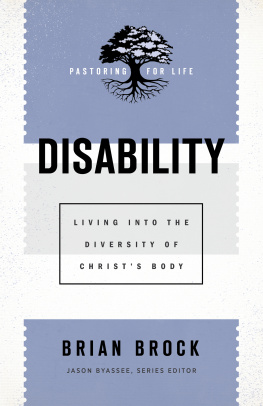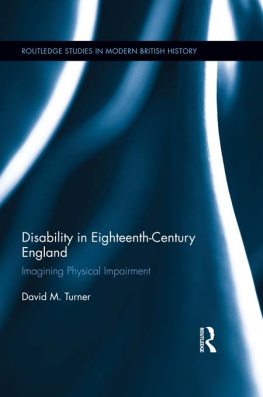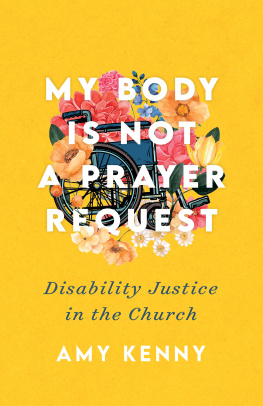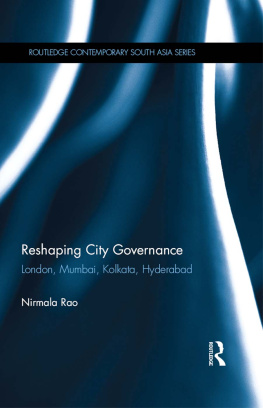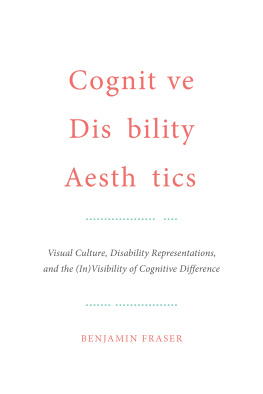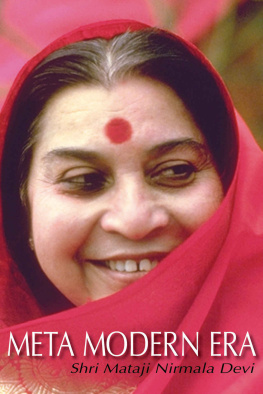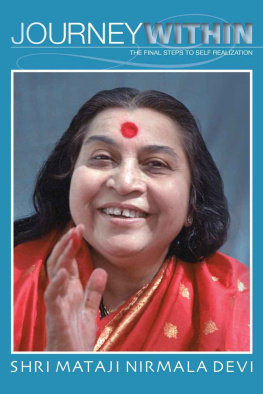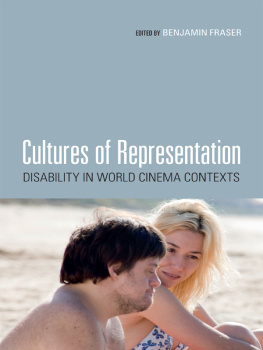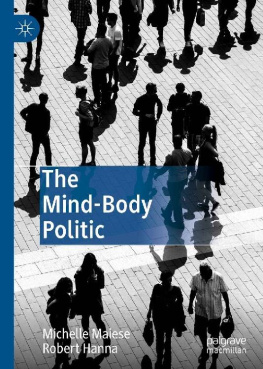Nirmala Erevelles - Disability and Difference in Global Contexts: Enabling a Transformative Body Politic
Here you can read online Nirmala Erevelles - Disability and Difference in Global Contexts: Enabling a Transformative Body Politic full text of the book (entire story) in english for free. Download pdf and epub, get meaning, cover and reviews about this ebook. year: 2011, publisher: Palgrave Macmillan, genre: Politics. Description of the work, (preface) as well as reviews are available. Best literature library LitArk.com created for fans of good reading and offers a wide selection of genres:
Romance novel
Science fiction
Adventure
Detective
Science
History
Home and family
Prose
Art
Politics
Computer
Non-fiction
Religion
Business
Children
Humor
Choose a favorite category and find really read worthwhile books. Enjoy immersion in the world of imagination, feel the emotions of the characters or learn something new for yourself, make an fascinating discovery.

- Book:Disability and Difference in Global Contexts: Enabling a Transformative Body Politic
- Author:
- Publisher:Palgrave Macmillan
- Genre:
- Year:2011
- Rating:3 / 5
- Favourites:Add to favourites
- Your mark:
- 60
- 1
- 2
- 3
- 4
- 5
Disability and Difference in Global Contexts: Enabling a Transformative Body Politic: summary, description and annotation
We offer to read an annotation, description, summary or preface (depends on what the author of the book "Disability and Difference in Global Contexts: Enabling a Transformative Body Politic" wrote himself). If you haven't found the necessary information about the book — write in the comments, we will try to find it.
Nirmala Erevelles: author's other books
Who wrote Disability and Difference in Global Contexts: Enabling a Transformative Body Politic? Find out the surname, the name of the author of the book and a list of all author's works by series.
Disability and Difference in Global Contexts: Enabling a Transformative Body Politic — read online for free the complete book (whole text) full work
Below is the text of the book, divided by pages. System saving the place of the last page read, allows you to conveniently read the book "Disability and Difference in Global Contexts: Enabling a Transformative Body Politic" online for free, without having to search again every time where you left off. Put a bookmark, and you can go to the page where you finished reading at any time.
Font size:
Interval:
Bookmark:
DISABILITY AND DIFFERENCE
IN GLOBAL CONTEXTS
IN GLOBAL CONTEXTS
ENABLING A TRANSFORMATIVE
BODY POLITIC
NIRMALA EREVELLES


DISABILITY AND DIFFERENCE IN GLOBAL GONTEXTS
Copyright Nirmala Erevelles, 2011.
All rights reserved.
First published in 2011 by
PALGRAVE MACMILLAN
in the United Statesa division of St. Martins Press LLC,
175 Fifth Avenue, New York, NY 10010.
Where this book is distributed in the UK, Europe and the rest of the world, this is by Palgrave Macmillan, a division of Macmillan Publishers Limited, registered in England, company number 785998, of Houndmills, Basingstoke, Hampshire RG21 6XS.
Palgrave Macmillan is the global academic imprint of the above companies and has companies and representatives throughout the world.
Palgrave and Macmillan are registered trademarks in the United States, the United Kingdom, Europe and other countries.
ISBN: 9780230100183
Library of Congress Cataloging-in-Publication Data
Erevelles, Nirmala, 1965
Disability and difference in global contexts : enabling a transformative body politic / NirmalaErevelles.
p. cm.
ISBN 9780230100183
1. Sociology of disability. 2. DisabilitiesPhilosophy. 3. People with disabilities. 4. Historical materialism. I. Title.
HV1568.E74 2011
305.9908dc23 2011019473
A catalogue record of the book is available from the British Library.
Design by Newgen Imaging Systems (P) Ltd., Chennai, India.
First edition: November 2011
10 9 8 7 6 5 4 3 2 1
Printed in the United States of America.
This book is dedicated to my family
My Husband
Robert M. Young (19682010)
My Daughter
Maya Mildred Young
&
My Parents
The Late Antony Joseph Erevelles and Mabel Erevelles
THIS BOOK WAS WRITTEN UNDER THE MOST DIFFICULT OF circumstances. I received the contract for writing this book during the time my husband was receiving treatment for brain cancer, and I was only able to finish it after he passed away on January 31, 2010. Thus, it was only inevitable that the process of writing this book was filled with emotional highs and lows, starts and stops, tears and laughter, hope and deep despair. Writing this book has therefore become a collective process with so many people to thank for helping me make it this far.
First and foremost I want to thank my teachers at Syracuse University, who were the first people to teach me to think critically and radically about disability: Steven J. Taylor, my advisor who always believed in me, Sari K. Biklen, who counseled me through all the ups and downs in graduate school, and my teachers Robert Bogdan, Hank Bersani, Diane Murphy, Douglas Biklen, and Priti Ramamurthy who influenced my thinking in so many ways. I also want to thank the special education graduate student cohort, who challenged my thinking in creative ways.
Second, I want to thank my colleagues at both Auburn University and the University of Alabama. At Auburn University, I would like to thank my colleagues Jim Kaminsky, Kimberly L. King Jupiter, Judy Lechner, Renee Middleton, Holly Stadler, Ivan Watts, and Patty Whang, for mentoring me in my first job and enabling me to venture out into radical projects even though I was untenured at that time. At the University of Alabama, I owe immense gratitude to Stephen Tomlinson, Natalie Adams, John Petrovic, Doug McKnight, and Becky Atkinson, who as amazing colleagues not only kept academia exciting, but also covered my classes, took over dissertation committees, released me from meetings so that I could take care of my husband, and supported my work. Your intellectual and personal solidarity is much appreciated. I also appreciate the solidarity of my colleagues Brittney Cooper, Sara Childers, Dave Dagley, Aaron Kuntz, Utz McKnight, Cecil Robinson, and Jerry Rosiek among others. To the staff members in the ELPTS department at the University Of Alabama, Edward Guy, Laura Ballard, Donna Smith, Angela Kelly, and Margie Carroll, a very warm thank you for all the work that you did for me with a ready smile. And to my amazing doctoral students who have sustained my passion for teaching and radical thinking in a difficult context, a warm thank you. Thank you Josh Burford, Daniel Dickens, Puneet Gill, Louis Ginocchio, Ingie Givens, Robert Hayes, Elizabeth Hendrix, Anne Kanga, Kathy Kinslow, Sikharini Majumdar , Carlton McHargh, Rachel McWhorter, Dymaneke Mitchell, Roland Mitchell, Andrea Minear, Jeena Owens, Tasha Parrish, Alison Schmitke, Noelle Witherspoon, and Gerald Woodthe list goes on. Teaching nurtures thinking and your thoughtful questions always inspired me to think harder. For those of you I have not mentioned here, note that it was an oversight that is much regretted.
To my amazing colleagues and friends at the Society of Disability Studies and the Disability Studies in Education Special Interest Group (SIG) at the American Educational Research Association, just knowing you all was an amazing educational and personal experience. I have learned so much from each one of you. Thank you Julie Allan, Liat Ben Moshe, Pamela Block, Susan Burch, Fiona Kumari Campbell, Eli Clare, David Connor, Scot Danforth, Lennard Davis, Stephen Drake, Phil Ferguson, Beth Ferri, Jim Ferris, Anne Finger, Ann Fox, Leslie Freeman, Susan Gabel, Deborah Gallagher, Anita Ghai, Carol Gill, Dan Goodley, Beth Haller, Alison Kafer, Deva Kasniz, Ravi Malhotra, Robert McRuer, Rod Michalko, David Mitchell, Angel Miles, Leroy Moore, Akemi Nishida, Corbett OToole, Beth Omanksy, Sara Palmer, Margaret Price, Leslie Roman, Carrie Sandahl, Susan Schweik, Tobin Siebers, Phil Smith, Sharon Snyder, Bethany Stevens, Tanya Titchkosky, Rosemarie Garland Thomson, and Linda Ware. You all formed a vibrant community for me, always pushing me to think harder, deeper, and even more dangerously about disability. In so many ways this book embodies so much of all your thinking. Thank you!
I am also very grateful to Samantha Briggs, Catherine Davies, Vikram Dravid, Lakshmi Goparaju, Pascal Herve, Rhoda Johnson, Ramu Kannan, Yolanda Manora, Priti Ramamurti, Dipinder Randhawa, Angelo Rivero-Santos, Aarti Saihjee, Ujwala Samant, Demetria Shabazz, Gowri Shankar, Ashwini Udgaonkar, Chandan Vaidya, and Demetria Shabazz. You nurtured me through the darkest moments of my life and kept me strong both by example and deed. The fact that I had the emotional strength to write this book is because of you. And to the large community of friends both in Tuscaloosa and in my virtual community on Facebook, you have been wonderful too in keeping me upbeat and happy with your caring words and much love.
To my graduate assistant Tasha Parrish, who has gone above and beyond the call of duty to help me finish this book, I am also grateful. Besides being brilliant, she is hardworking, and so generous with her time, I feel guilty I may have exploited her! Thank you Tasha.
To my family who has supported me in so many ways, you also have my sincere gratitude. Special thanks goes to Sunil and Ayse Erevelles, and Sushma and Ravikumar Joseph. Also my most special gratitude goes to my mother, who has always believed in me and worked really hard to support me and my work throughout my life but especially during Roberts illness and the months after his passing.
I am also grateful to my little six-year-old daughter, Maya, who over the last few months was willing to entertain herself while her mama struggled with the book. She has been patient, funny, adorable, helpful, and supportive not only through Roberts illness but throughout the process of writing this book.
Next pageFont size:
Interval:
Bookmark:
Similar books «Disability and Difference in Global Contexts: Enabling a Transformative Body Politic»
Look at similar books to Disability and Difference in Global Contexts: Enabling a Transformative Body Politic. We have selected literature similar in name and meaning in the hope of providing readers with more options to find new, interesting, not yet read works.
Discussion, reviews of the book Disability and Difference in Global Contexts: Enabling a Transformative Body Politic and just readers' own opinions. Leave your comments, write what you think about the work, its meaning or the main characters. Specify what exactly you liked and what you didn't like, and why you think so.

